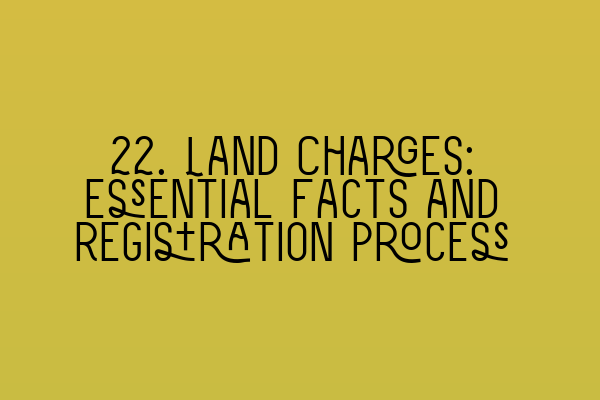Welcome to another informative blog post from SQE Property Law & Land Law. Today, we will be diving into the essential facts and registration process of land charges. Land charges play a crucial role in property transactions, so it’s important to have a solid understanding of how they work. By the end of this blog post, you will have a clear understanding of the registration process and why it’s essential. Let’s get started!
What are Land Charges?
Land charges are restrictions or interests that affect a specific piece of land. They are usually registered against the title of the property and act as warning signs for prospective buyers and lenders. The purpose of land charges is to ensure transparency and protect the interests of individuals involved in property transactions. Understanding these charges is essential when it comes to making informed decisions about property purchases or loans.
The Registration Process
The registration process for land charges is governed by the Land Charges Act 1972. It’s important to note that not all land charges require registration, but it’s still prudent to conduct a thorough search to identify any potential charges that may affect the property you are interested in.
Search at the Land Charges Department
To initiate the registration process, a buyer or their solicitor must conduct a search at the Land Charges Department. This search aims to uncover any charges that have been registered against the property. These charges may include, but are not limited to:
- Mortgages
- Notices of estate contracts
- Notices of leases
- Notices of options
- Restrictions under the planning acts
- Restrictions under the Landlord and Tenant Act 1954
It’s important to consult with your solicitor during this process to ensure all relevant charges are identified and understood.
Completion of Application Forms
Once the relevant charges have been identified, the next step is to complete the appropriate application forms. These forms can vary depending on the specific charge being registered. It’s crucial to fill out these forms accurately and provide all necessary supporting documents to avoid any delays in the registration process.
If you are unsure about which forms to use or how to complete them, consulting a professional solicitor who specializes in property law is highly recommended.
Submission to the Land Charges Department
After completing the application forms, they must be submitted to the Land Charges Department along with the required application fee. The Land Charges Department will then process the application and carry out the necessary checks to ensure accuracy and completeness.
It’s important to note that the registration process can take some time, so it’s advisable to factor in sufficient time for the application to be processed.
Why is Land Charges Registration Essential?
Land charges registration is essential for multiple reasons. Firstly, it provides prospective buyers and lenders with crucial information about the property they are interested in. By conducting a search and registering any charges against the property, individuals can make informed decisions about the risks and benefits associated with the property.
Secondly, land charges registration ensures that all interested parties have equal access to relevant information. By registering charges against the property, the Land Charges Department creates a level playing field where all individuals involved in the transaction can assess the property’s condition and potential risks.
Lastly, land charges registration provides legal protection to both the buyer and the lender. If any undisclosed charges come to light after the purchase or loan has been made, the registering party can be held liable for failing to disclose vital information. This protection ensures fairness and transparency in property transactions.
Conclusion
In summary, land charges play a vital role in property transactions. Understanding the registration process is crucial for anyone involved in buying or lending against a property. By conducting a thorough search, completing the appropriate application forms accurately, and submitting them to the Land Charges Department, individuals can ensure transparency, protect their interests, and make informed decisions. If you need guidance or assistance throughout this process, don’t hesitate to consult a professional solicitor who specializes in property law.
For more helpful resources and information related to the SQE exams and preparation courses, please check out the following articles:
SQE 1 Practice Exam Questions,
SQE 1 Practice Mocks FLK1 FLK2,
SQE 2 Preparation Courses,
SQE 1 Preparation Courses, and
SRA SQE Exam Dates.
